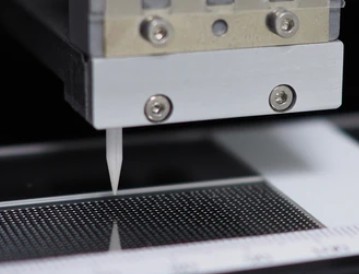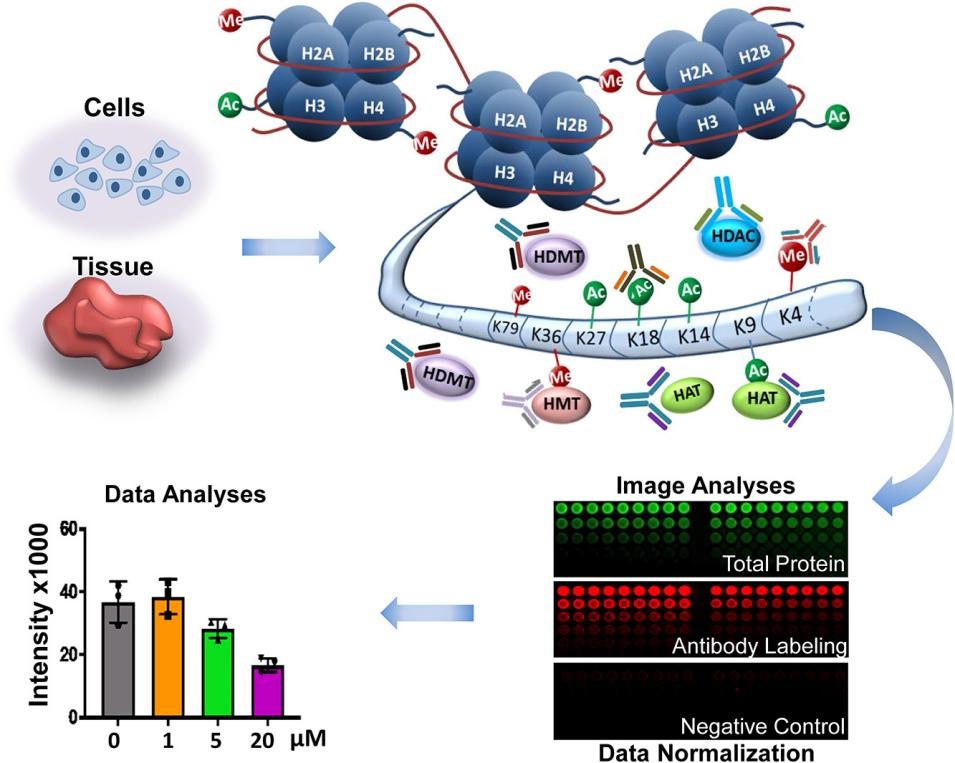
- Home
- PTMs Proteomics
- Protein Microarray-Based PTM Analysis

Protein microarrays are miniaturized immunoassays with the ability to effectively analyze thousands of proteins/peptides without the need for pre-isolation or enrichment of complex samples. This technique has several key advantages, including high sensitivity/specificity of the analysis, requiring a small number of biological samples but yielding a large amount of data. Moreover, protein microarray technology also provides a straightforward and powerful strategy for the identification and quantification of various post-translational modifications (PTMs).
Protein PTMs are integral parts of the major cellular regulatory mechanisms that determine protein function, cellular localization, and stability. In addition to mass spectrometry (MS)-based proteomics analysis, protein microarray is another powerful technique for screening PTMs, improving our ability to identify their targets and regulatory effects. Protein microarrays are primarily based on specific antigen-antibody reactions, which occur on miniaturized supports, such as a chip or slide. Therefore, protein microarrays have the advantage of simultaneously evaluating tens to thousands of molecules in small samples with highly specific recognition for the detection system. To improve the understanding of PTMs, protein microarrays have been used as a platform for understanding in vitro enzymatic reactions. In addition, by using cultured cell extracts, protein microarray technology has been applied to conduct direct studies of protein PTMs without the use of labor-intensive protein purification steps.
 Fig. 1 High-throughput profiling of histone post-translational modifications and chromatin modifying proteins by reverse phase protein array. (Wang, Xuan, et al, 2022)
Fig. 1 High-throughput profiling of histone post-translational modifications and chromatin modifying proteins by reverse phase protein array. (Wang, Xuan, et al, 2022)
Protein microarrays offer the advantages of quantitatively identifying protein PTMs in an unbiased manner under specific cellular conditions. Creative Proteomics strives to be a guide and assistant in protein PTM research for our customers worldwide. We have established a high-quality antibody-based protein microarray platform for the global profiling of a wide range of protein PTMs. Reverse phase protein microarrays (RPPAs) are characterized by high multiplex and the ability to simultaneously analyze thousands of proteins and their PTMs that may be present in the crude cells or tissue lysates. The small number of samples required makes them powerful tools in limited samples (e.g., clinical samples). Specifically, our experienced experts provide a one-stop service, ranging from sample preparation, protein extraction and digestion, peptide enrichment, antibody selection, and screening of protein arrays for PTMs to data analysis and interpretation. Our bioinformatics team provides bioinformatics analysis services for protein microarrays and is able to handle large data sets. Importantly, our services enable a wide range of PTM identification and analysis, including phosphorylation, acetylation, glycosylation, ubiquitination, SUMOylation, and more.
Would you like to know more about our protein microarray-based protein PTM analysis services? We look forward to hearing from you! Please use our contact form for general inquiries. We will then forward your request to the correct contact.
References
Our products and services are for research use only.